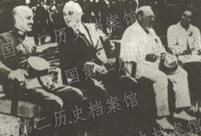 YOG kicks off in Nanjing
YOG kicks off in Nanjing
 Colorful life at Youth Olympic Village of Nanjing 2014 YOG
Colorful life at Youth Olympic Village of Nanjing 2014 YOG
 Royal Taoist temple to open to public
Royal Taoist temple to open to public
 Female soldiers at quake-hit area
Female soldiers at quake-hit area
 Shocking photos of cruel battles in Ukraine
Shocking photos of cruel battles in Ukraine
 Amphibious armored vehicle unit conducts open sea drill
Amphibious armored vehicle unit conducts open sea drill
 Water relay in Henan
Water relay in Henan
 Ethnic culture feasts eyes of travelers
Ethnic culture feasts eyes of travelers
 80 security dogs assembled in Nanjing police dog training base
80 security dogs assembled in Nanjing police dog training base
 Graffiti artists paint on street walls in Xinjiang
Graffiti artists paint on street walls in Xinjiang
Photo/China Daily
CTS Songshan Shaolin Culture Tourism Company, which collects an admission fee of 100 yuan ($16) a person to enter the scenic park that people making the pilgrimage to the temple must pass through, declined to provide China Daily with visitor numbers or annual revenue.
Grizzled masters endure the daily invasion with stoic expressions. Shaven-headed novice monks talk loudly on smartphones, or sell incense and trinkets, or access the Wi-Fi now available in the ancient buildings.
Shaolin-brand medical books are sold on Taobao, China's e-commerce equivalent of Amazon, and Buddhist disciples can now avoid the trek up Songshan mountain by paying to study at Shaolin by correspondence on the Internet.
Since 2010, the temple has had an online social media presence on Facebook equivalents such as SinaWeibo, and now boasts more than 150,000 followers. There is also a gaming app being developed to teach users kung fu on their mobile phones.
Shi, one of the first Chinese monks to gain an MBA, says Shaolin's business interests have been set up to support and preserve its 1,500-year-old culture.
"We have entered a commercialized society ... so people tend to evaluate things from the angle of commercialization," Shi says. "But you need to look at what is behind the business practice. Some people do business so they can survive, and some do it to seek fortune. Shaolin Temple just wants to survive, to practice Buddhism."
In March, executives from US tech giants Google and Applejoined the ranks of prominent global businesspeople to have received Shi's wisdom.
Members of the China Entrepreneurs Club, a group that consists of 46 leaders of the country's top private companies, also spoke with the abbot in a closed-door session this year at a conference themed "self cultivation of entrepreneurs".
These kinds of engagements are part of the reason why not everyone is convinced Shaolin's growing commercial interests are entirely altruistic, including outspoken Chinese netizens and some prominent martial arts masters from rival schools.
In a shaded courtyard, kung fu masters flow through fighting forms with a sinuous, otherworldly grace.
A group of students look on as the shaven-headed monks demonstrate the basic stances of wushu, the backbone of Shaolin's fighting style, made famous worldwide by the moviemakers of Hong Kong and Hollywood.
These eager pupils are African, American and European. And while some have made the pilgrimage to Shaolin seeking the fabled martial prowess that will stop an enemy's heart with a single blow, just as many say they have come looking for a professional edge.
As recently as a decade ago, foreign students were uncommon at Shaolin.
But, as Demina Masoula knows first hand, things have changed.
The 43-year-old business and marketing consultant is part of a group from Greece that has come to study at Shaolin for about two weeks.
An insurancecompany executive and an engineer for a multinational company practice nearby while Masoula takes a breather from the demanding 4:30 am to 9 pm daily training regime.
She believes the principles inherent in the kung fu she is learning can be applied to her professional life. It is a way, she says, of honing business instincts to react like muscle memory.
"In business, you have to be flexible, you have to find new paths and change. You have to see a crisis and avoid it. Kung fu teaches you to be fluid, like water, because everything in kung fu flows and stagnation is bad."
 |  |
 Eye-catching guides at the opening ceremony of YOG in Nanjing
Eye-catching guides at the opening ceremony of YOG in Nanjing A female missile launch company of PLA
A female missile launch company of PLA China, the U.S., Britain and the Soviet Union call for Japan's unconditional surrender
China, the U.S., Britain and the Soviet Union call for Japan's unconditional surrender Beautiful night scenery of Nanjing
Beautiful night scenery of Nanjing Passenger transport starts on Tibet's new railway
Passenger transport starts on Tibet's new railway Story of outstanding Beijing swat sniper
Story of outstanding Beijing swat sniper Beautiful policewoman in an anti-terrorism SWAT team
Beautiful policewoman in an anti-terrorism SWAT team Cute photos of little Taoist nuns and monks go viral online
Cute photos of little Taoist nuns and monks go viral online Photo story: How a baby panda grows up
Photo story: How a baby panda grows up Star-leveled nursing home in a small county
Star-leveled nursing home in a small county Evidence of monstrous crime of Japanese invaders
Evidence of monstrous crime of Japanese invaders Foreign models compete with Chinese in Cheongsam show
Foreign models compete with Chinese in Cheongsam show The beautiful pictures of ancient Chinese architecture
The beautiful pictures of ancient Chinese architecture The Muslims involved in relief work
The Muslims involved in relief workDay|Week|Month